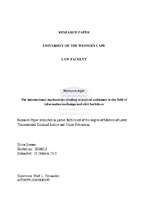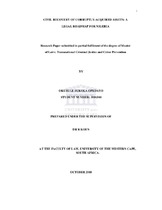The international mechanisms relating to mutual assistance in the field of information exchange and civil forfeiture
Abstract
Several international instruments relating to the forfeiture of assets derived through
unlawful means have been developed in the last decade. These relate to both civil and criminal forfeiture proceedings. Nevertheless, the processes of tracing the assets and having them forfeit to the State present formidable obstacles to justice authorities enforcers around the world. The fact of the matter is that the advent of the internet has made it easier for money launderers to camouflage the nature and the physical locality of their ill-got gains. This has made it all the more necessary for states and financial institutions to co-operate more closely in hitting the criminals where it hurts most – their pockets. However, the international structures that provide for mutual legal assistance procedures are drafted in broad terms or in guideline-form. Most of the books and journal articles dealing with money laundering devote scant attention to this very important aspect of combating transnational economic criminality. In most of the literature, this topic is simply avoided. This paper, which confines itself to civil recovery proceedings, strives
to determine first, what international mechanisms are available for obtaining information located abroad that could be used for domestic civil forfeiture, and second, to identify some of the most intractable problems encountered by justice authorities in their attempts to attach property situated abroad. The idea is to identify the principal point of discordance, and to suggest ways in which the international instruments governing civil forfeiture could be amended so as to make
them more user friendly.
Related items
Showing items related by title, author, creator and subject.
-
An evaluation of Zambia’s asset recovery laws
Soko, Cassandra (2013)Contrary to Common perception, corruption is not all that ails Africa. It is only a component of the multifaceted economic criminality that leads to illicit capital flight from developing states and those undergoing political ... -
Civil recovery of corruptly-acquired assets: a legal roadmap for Nigeria
Opedayo, Okubule Bukola (University of the Western Cape, 2010)The aim of this research paper is to examine the legal framework for the recovery of corruptly-acquired assets, with particular emphasis on the Nigerian situation. Its primary focus is a detailed examination of the legal ... -
Civil recovery of corruptly acquired assets in Uganda
Bogere, Philippa (University of the Western Cape, 2014)




